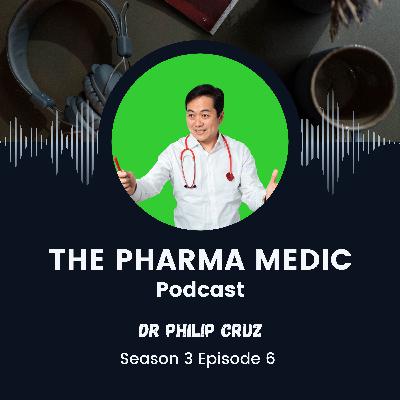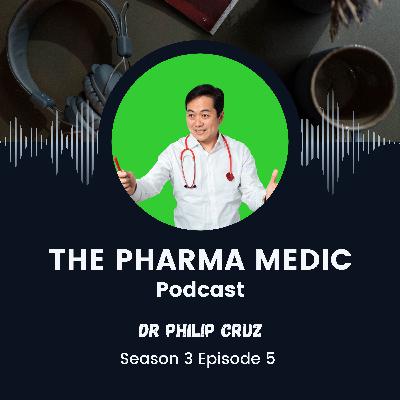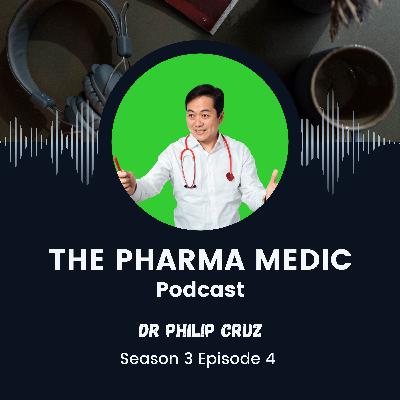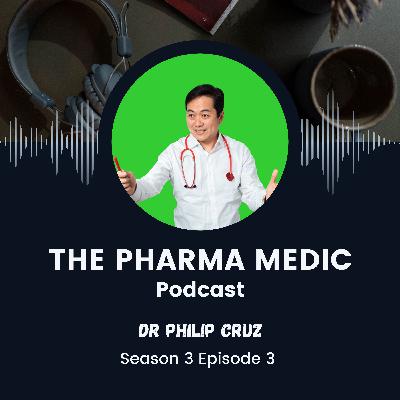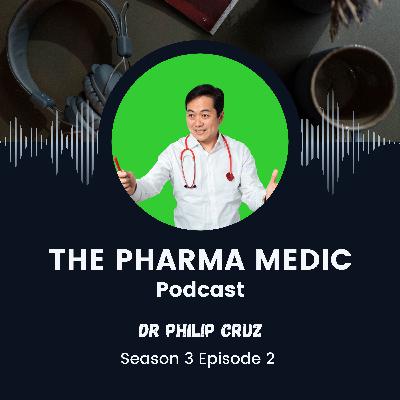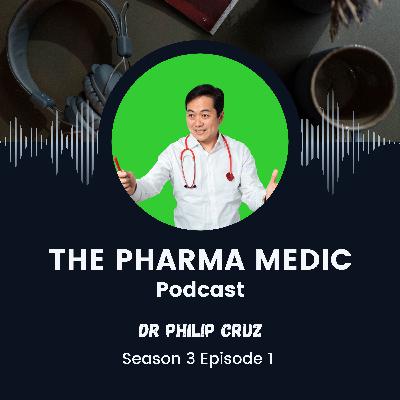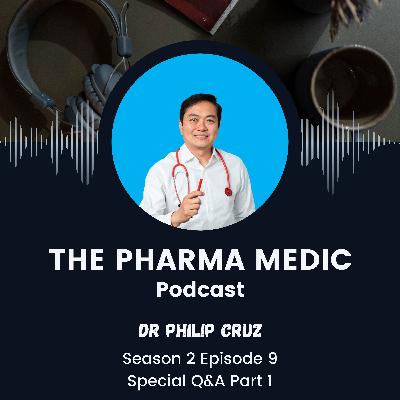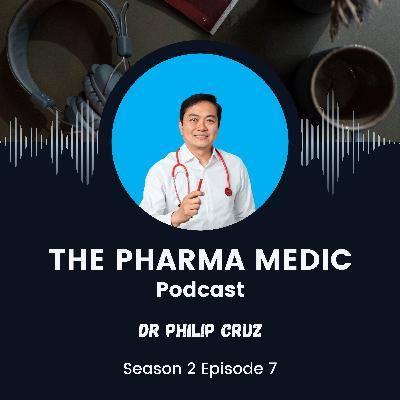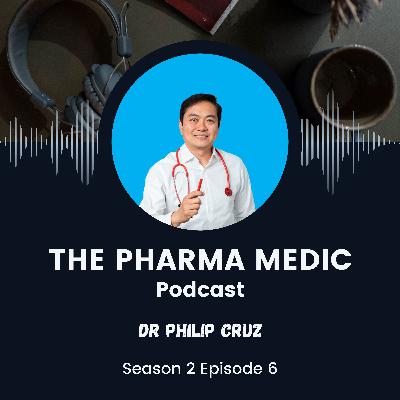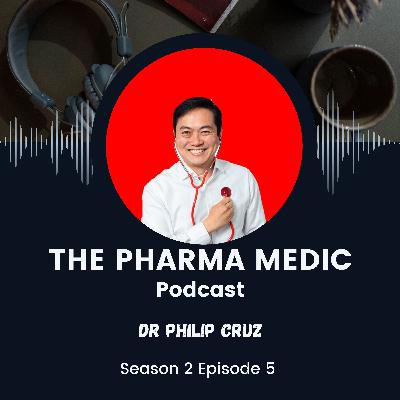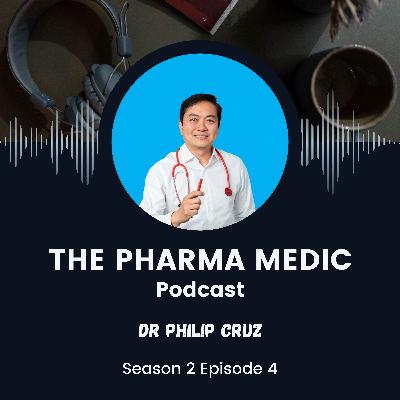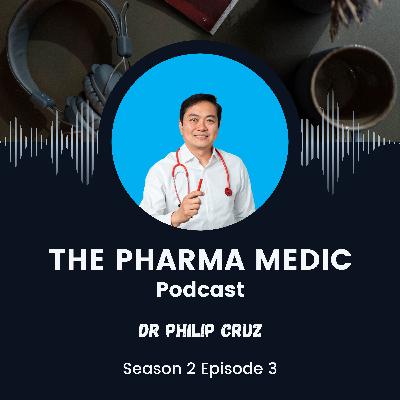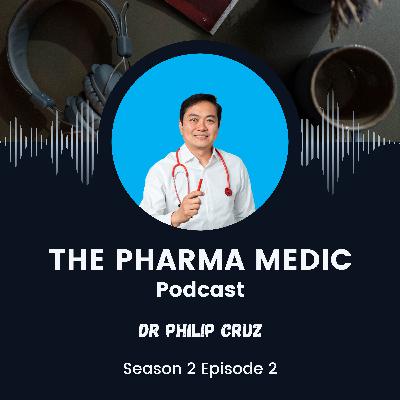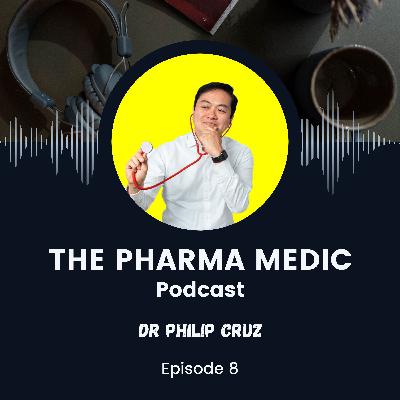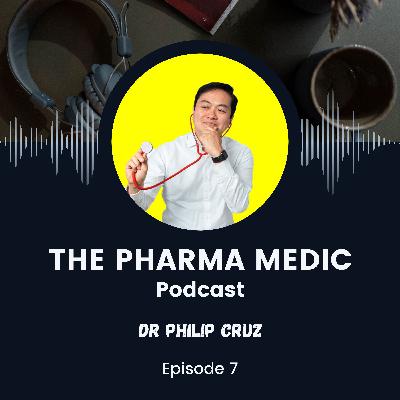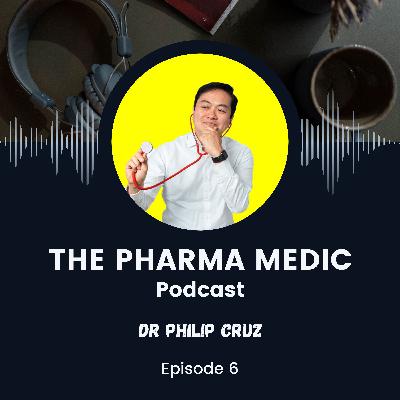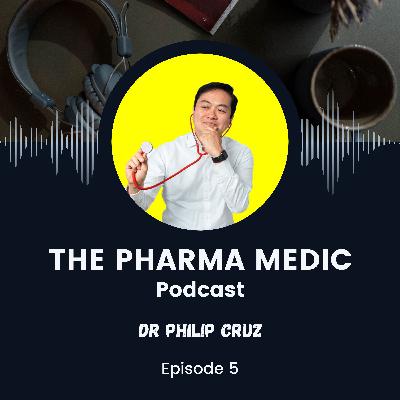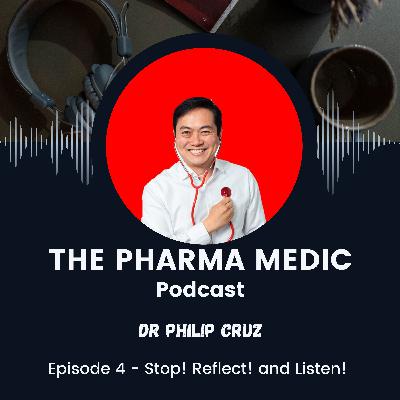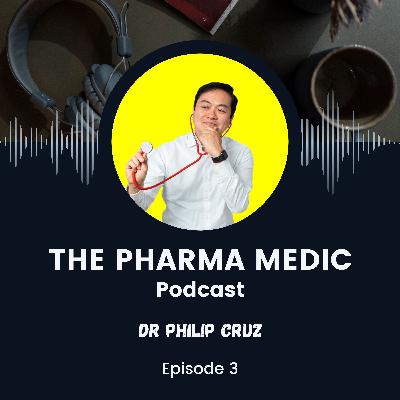Discover The PHARMA MEDIC Podcast
The PHARMA MEDIC Podcast

The PHARMA MEDIC Podcast
Author: Philip Cruz, MD
Subscribed: 7Played: 59Subscribe
Share
Description
The Pharma Medic Podcast is your go-to source for insights, stories, and expert advice in the dynamic field of medical affairs. Hosted by Philip Cruz, a seasoned medical affairs professional with 20 yrs experience and a passion for healthcare innovation, emotional intelligence, personal growth and development , each episode delves into the critical aspects of medical affairs, from navigating ethical dilemmas and leveraging digital health technologies to embracing patient-centric approaches and climbing the career ladder. Designed for healthcare professionals, aspiring medical affairs experts, and industry veterans alike, or just anyone who is curious of what we do, this podcast offers practical tips, real-world examples, and thought-provoking discussions to help you thrive in your career and make a meaningful impact on patient outcomes. Join us as we explore the evolving landscape of medical affairs and uncover the strategies and skills needed to excel in this vital field.
24 Episodes
Reverse
In Part 2 of this two-part series, we shift from insight to action—focusing on practical strategies for medics looking to break into medical affairs roles in 2025.
Building on Part 1, which explored why it has become increasingly difficult to enter the field, this episode is all about helping you move forward with clarity, intention, and confidence. Whether you’re a doctor, pharmacist, or scientist feeling stuck after multiple job applications, this episode offers real-world advice and guidance to help you build your way in.
Topics discussed in this episode include:
How to skill up for the modern medical affairs role by bridging gaps in business acumen, regulatory knowledge, digital fluency, and strategic thinking.
Creative ways to gain relevant experience—such as starting in adjacent roles, participating in academic-industry collaborations, taking on contract positions, or reframing your clinical and research background in industry language.
Networking tips that actually work, including how to connect authentically on platforms, build your professional presence, and find mentors who have already made the transition.
How to make your application stand out by tailoring your CV, using the STAR format (Situation, Task, Action, Result) to demonstrate impact, and presenting transferable skills in a compelling way.
Why mindset is crucial—especially in a competitive landscape where rejection is often more about positioning than ability. We explore the importance of patience, persistence, and staying connected to your bigger purpose.
If you’ve been wondering what to do next—or how to reposition yourself after hitting repeated roadblocks—this episode is for you. It’s not about having the perfect profile; it’s about taking consistent, intentional steps that bring you closer to your first break in medical affairs.
As we say in the episode:
You’re not unqualified. You’re unpositioned.
It’s not rejection. It’s redirection.
And you don’t need to be perfect. You need to be intentional.
Whether you’re early in your journey or already applying, this episode is designed to give you renewed focus, energy, and encouragement to keep going.
In this first part of a two-part series, we take a deep and honest look at why it’s become significantly harder for medics to break into medical affairs roles in 2025.
This episode explores the major shifts that have taken place in the industry over the past two decades, including how medical affairs has evolved from a back-office support function to a critical strategic pillar within pharmaceutical companies. We unpack why today's hiring criteria have become increasingly stringent, bespoke, and competitive, and why even highly qualified clinicians and scientists are struggling to gain their first foothold in the field.
Key themes covered in this episode include:
The transformation of medical affairs into a strategic leadership function
The growing demand for professionals who can integrate scientific knowledge with business acumen, compliance, and digital fluency
Why many roles now receive 200+ applicants and favor those with specific therapeutic experience
The rise of digital expectations — from omnichannel communication to data-driven engagement
The importance of soft skills, emotional intelligence, and cross-functional collaboration
Regional challenges in Europe and Asia, including regulatory constraints and cultural preferences for local experience
We also explore the emotional toll of rejection, the systemic barriers that make it feel impossible to even get an interview, and the awareness gap many candidates have about what the role actually entails. Importantly, we challenge the myth of the “perfect fit” and introduce the idea of reframing your clinical and academic experience through the lens of transferable skills.
This episode is a blend of realism and encouragement—grounded in industry insight but focused on empowering listeners with a new perspective. It sets the stage for Part 2, which will offer practical strategies, networking approaches, CV positioning tips, and mindset shifts to help you actively build your way into medical affairs.
Whether you’re feeling stuck, burnt out, or just unsure how to reposition yourself for a future in pharma, this episode provides the clarity, context, and encouragement you need to take your next step.
In this episode of The Pharma Medic Podcast, we dive into the rollercoaster that is the modern job search—especially for those navigating careers in Medical Affairs and the broader pharma world. Inspired by a recent panel discussion at King’s College London, I reflect on the honest, sometimes frustrating realities of trying to land the right role in today’s hyper-competitive market.
From being ghosted after applications, to investing hours crafting tailored cover letters only to never hear back, many of us have experienced the emotional toll that comes with trying to get noticed—and hired. This episode is a candid and comforting guide for anyone who's ever felt stuck, overlooked, or just plain exhausted by the job hunt.
But we don’t stop at the frustration—we explore strategy too. One of the key takeaways from the panel discussion was this: it’s not just about your resume or your LinkedIn profile. It’s about how you show up. It’s about your presence—the value you bring in how you engage, comment, and contribute to the conversations that matter in your field.
We talk about how engagement on LinkedIn—insightful comments, thoughtful questions, and adding perspective to industry posts—can do more for your visibility than polishing your summary line for the 15th time. Your profile matters, of course. But the way you think and show up? That’s what people remember.
I also unpack a lesser-discussed reality: sometimes, roles are posted publicly because of policy or regulatory requirements, but the hiring team already has an internal candidate in mind. It’s not personal. It’s procedural. And yes, it stings. I’ve been there, and in this episode, I share what to do when it happens—and how to still use your application to stand out by offering the unique value of an “outsider’s” perspective.
We’ll also dig into the framework hiring managers often use to evaluate resumes in those first 15 to 20 seconds. Spoiler alert: they’re not reading your life story. They’re asking four key questions:
What role are you targeting?
What results have you delivered?
What skills and strengths do you bring?
Can you repeat your success in this role?
And all of that? Needs to be clear in the top third of your resume.
I’ll walk you through how to structure your resume to make an immediate impact—starting with a target job title, top three skills, a short personal branding statement, a showcase of key achievements, and a strengths section tailored to the role.
Finally, I reflect on the value of not internalizing rejection. If a role asks for specific experience—say, affiliate experience in a certain region or regulatory submission exposure—and you don’t have that, it doesn’t mean you’re not capable. It just means the fit wasn’t quite there. That’s not a measure of your potential. That’s alignment, not inadequacy.
This episode is a reminder that your journey is unfolding, even if it doesn’t look like it today. Whether you’re rewriting your resume for the third time, considering a bold pivot, or just trying to stay hopeful—this one’s for you.
Tune in to hear stories, strategies, and the mindset shifts that will help you not just survive the job search, but find your way through it—one conversation, one comment, one brave next step at a time.
In this episode of The Pharma Medic Podcast, the focus is on how great leaders aren’t those with all the answers but those who ask the right questions. Inspired by David Marquet, a former U.S. Navy submarine commander featured on Coaching for Leaders, the discussion breaks down seven transformational questions that help shift teams from passive followers to proactive leaders.
Leadership Isn’t Instant—It’s Built Through Smart Followership
There’s a common misconception that leadership is about taking charge, making decisions, and giving orders. In reality, the best leaders first learn how to be great followers—those who challenge ideas, think critically, and take ownership.
David Marquet’s leadership transformation on the USS Santa Fe wasn’t about commanding his crew—it was about changing the way they communicated. He didn’t rely on authority; he created an environment where everyone took responsibility for their decisions.
This shift from a leader-follower model to a leader-leader model is crucial in any industry, including Medical Affairs, where decisions affect not just business outcomes but also scientific accuracy and patient care. The ability to ask better, more empowering questions can completely transform team dynamics and decision-making.
Why Questions Matter More Than Answers
Hesitation can be one of the biggest blockers to progress. Many have been in meetings where a bad idea is floating around, but no one speaks up. Or, on the other side, where someone sees a potential issue but doesn’t feel confident enough to challenge it.
Great teams don’t function on blind agreement—they thrive on critical thinking, discussion, and shared leadership. That’s why the right questions are often more important than the right answers.
This episode explores seven powerful questions that turn passive followers into proactive leaders.
1. Ask one question at a time—avoid overwhelming people with question stacking.
2. Use questions to learn, not to teach—invite new perspectives instead of reinforcing personal beliefs.
3. Make sure your questions are neutral—don’t lead people toward a preferred answer.
4. Instead of yes/no questions, start with “what” or “how”—this encourages deeper discussions.
5. Swap out “why” for “tell me more”—this creates trust instead of defensiveness.
6. Avoid self-affirming questions—seek real insights rather than just validation.
7. Base discussions on what is known—use past experiences to inform future decisions.
Instead of striving to have all the answers, focus on creating an environment where the best answers can emerge. That’s what real leadership is about.
As always, keep learning, keep leading, and stay curious.
Effective communication is more than just choosing the right words—it’s about creating meaningful connections, building trust, and navigating challenging conversations with confidence and clarity. In this episode of The Pharma Medic, we dive into Sam Horn’s insightful book, Tongue Fu!®: How to Deflect, Disarm, and Defuse Any Verbal Conflict, and explore how its principles can be applied to the dynamic world of medical affairs.
Whether you're engaging with healthcare providers (HCPs), collaborating with cross-functional teams, or presenting complex scientific data, the way you communicate can either foster collaboration or create barriers. Medical affairs professionals are often tasked with translating complex information into digestible insights, managing cross-functional expectations, and addressing challenging questions—all of which require finesse in communication.
In this episode, we explore:
👉 The Power of Language: How small changes in phrasing can shift conversations from confrontational to collaborative, and why choosing words wisely is crucial in medical affairs. Learn how replacing defensive statements with curiosity-driven responses can open up constructive dialogue and build trust with stakeholders.
👉 Handling Criticism with Grace: Discover how to deflect rather than defend when faced with criticism, whether it’s from internal stakeholders or external partners. We’ll discuss strategies to acknowledge concerns while steering conversations toward solutions and maintaining professionalism.
👉 Framing Requests Positively: Instead of focusing on what not to do, learn how to reframe your requests to highlight desired outcomes. This approach encourages cooperation and prevents resistance in situations like compliance reviews, stakeholder meetings, and cross-functional collaborations.
👉 The Art of Asking 'How' and 'What' Questions: Redirect unproductive conversations by using powerful questions that encourage problem-solving and collaboration, rather than placing blame. This technique is especially useful when addressing concerns raised during regulatory discussions or medical strategy meetings.
👉 Responding to Complaints with Empathy: Learn how to acknowledge frustrations and concerns from healthcare providers or colleagues without escalating tensions. A simple shift in response can transform complaints into opportunities for improvement and collaboration.
👉 Managing Emotional Responses: In high-stakes environments like medical affairs, staying composed under pressure is critical. Discover techniques to pause, reframe, and respond thoughtfully—even when conversations become heated or challenging.
👉 Encouraging Open Dialogue: Foster a culture of transparency and collaboration by inviting feedback in a way that feels safe and productive. Whether it's a team meeting or a one-on-one discussion, asking the right questions can unlock valuable insights and strengthen relationships.
👉 Continuous Improvement in Communication: Communication is a skill that requires constant reflection and refinement. We’ll share practical ways to evaluate your conversations, learn from past interactions, and continuously enhance your communication style for greater impact.
This episode is packed with real-world examples and coaching-style insights that will empower you to become a more effective communicator in the complex and highly collaborative world of medical affairs. Whether you're an experienced leader or just starting out in the field, these principles will help you navigate tough conversations with confidence and poise.
Season 3 Ep.1 : Breaking Down Barriers – Tackling the 5 Dysfunctions of a Medical Affairs Team. Survival Tips!
Welcome to Season 3 of The Pharma Medic! In this kickoff episode, we dive into one of the most transformative frameworks for team success: Patrick Lencioni’s The Five Dysfunctions of a Team. Whether you’re leading a team in medical affairs or collaborating across departments, this episode is packed with insights, reflections, and actionable coaching to help you build trust, foster collaboration, and drive results.
We begin with a personal story about transitioning into European corporate culture, highlighting how team dynamics can vary widely across different environments. From hierarchy-driven systems to more egalitarian workplaces, the nuances of teamwork set the stage for understanding why Lencioni’s model is so impactful.
Then, we explore the five dysfunctions that can derail any team:
Absence of Trust – Learn how vulnerability is the foundation of trust and how to create a safe space for openness in your team.
Fear of Conflict – Discover how healthy, respectful debate drives better decision-making and why avoiding conflict can hinder innovation.
Lack of Commitment – Understand how clarity and alignment are essential for genuine buy-in and how to prevent ambiguity in team decisions.
Avoidance of Accountability – Explore why peer-to-peer accountability is key to maintaining high standards and how to foster a feedback-friendly culture.
Inattention to Results – Refocus your team on shared goals and collective success by aligning personal contributions with organizational objectives.
Through real-world examples, coaching prompts, and practical advice, this episode serves as your guide to recognizing and addressing these dysfunctions in your own teams. Each dysfunction is paired with actionable strategies to help you build a cohesive, high-performing team, whether you’re navigating the complexities of medical affairs or any collaborative work environment.
Coaching Highlights:
Reflect on your team’s dynamics with targeted questions and prompts.
Embrace vulnerability and accountability as tools for growth.
Transform tension into alignment and shared purpose.
This episode isn’t just about theory—it’s about transformation. By the end of this session, you’ll have the tools to identify where your team stands and the first steps to take toward greater cohesion and success.
Join me on this journey of discovery and growth as we break down the barriers to effective teamwork and uncover the potential of working together toward a common goal. Have thoughts, questions, or your own team experiences to share? Email me at thepharmamedic@gmail.com.
Tune in now and take the first step toward building stronger, more collaborative teams in medical affairs and beyond!
As the year draws to a close, The Pharma Medic takes a heartfelt moment to reflect, celebrate, and share the wisdom gained over a year of insightful conversations. In this first part of the special year-end Q&A, we delve into your most compelling questions about thriving in the dynamic world of medical affairs.
Let us start by exploring the foundational skills that set medical affairs professionals apart—active listening and the ability to ask the right questions. These seemingly simple skills hold immense power, fostering understanding, collaboration, and trust in every interaction. I share personal anecdotes, including a pivotal career moment where stepping up to present in front of senior leaders became a defining opportunity—proving that visibility and authenticity can open doors you never imagined.
Let us also dive deep into the importance of resilience, discussing how setbacks and failures, though challenging, are often blessings in disguise. Drawing from my own experiences, I explain how failures have served as valuable lessons, leading to unexpected growth and opportunities. This theme ties into a personal favorite quote: “When one door closes, a window of opportunity opens.” It’s a reminder that every obstacle can pave the way for new beginnings if we maintain perspective and perseverance.
A recurring message in this episode is the importance of self-advocacy—learning to recognize and highlight your achievements. Too often, professionals in medical affairs work tirelessly behind the scenes, assuming their contributions will speak for themselves. However, I share why it’s vital to own your story, celebrate your wins, and make your impact visible.
This episode is not just about professional advice but also about cultivating self-awareness and embracing humanity in leadership. With actionable tips, and personal reflections, Part 1 sets the stage for continued growth and inspiration.
Join the conversation, reflect on your own journey, and send in your thoughts to thepharmamedic@gmail.com. And don’t miss Part 2, where we’ll tackle even more of your thought-provoking questions to close out the year on a high note!
This episode explores the art of productivity in a high-stakes, fast-paced industry. Starting with a quote from Steve Jobs—“Focus is about saying no”—listeners are invited to think about productivity beyond task completion, inspired by Graham Alcott’s book , "How to Be a Productivity Ninja". The episode kicks off with the concept of ruthless focus, emphasising the power of saying “no” to stay aligned with strategic goals. By filtering tasks that truly drive patient outcomes, medical affairs professionals can direct their energy towards what matters most.
The second segment introduces Zen-like calm, urging listeners to maintain composure under pressure. With examples of high-stakes scenarios, the host highlights techniques like grounding exercises that help professionals keep cool and resolve issues efficiently. This approach allows for a big-picture perspective, enabling medical affairs teams to handle challenges without derailing their focus.
Next, the episode addresses technology's role, underscoring that tools should enhance productivity rather than become distractions. With a “tech checklist,” listeners are encouraged to evaluate which metrics and insights truly drive their projects forward. Technology in medical affairs should simplify rather than overwhelm, and the checklist approach can prevent the pitfalls of data overload.
Stealth mode, the fourth segment, offers a tactic for protecting time for deep work. In medical affairs, where collaboration is critical, finding uninterrupted work periods is challenging but essential for strategic projects. The host shares examples of setting aside dedicated time blocks, encouraging professionals to use these moments for high-focus work that supports strategic initiatives.
Finally, the episode brings in purpose-driven productivity, highlighting the importance of aligning every action with the broader mission of impacting patient outcomes. Starting each week by asking, “What’s my core purpose?” helps professionals focus on tasks that create meaningful contributions rather than mere activity.
In wrapping up, The Pharma Medic reminds listeners that productivity isn’t just about ticking boxes but about making a lasting impact in healthcare. By embracing ruthless focus, calmness in crisis, thoughtful tech use, stealth mode, and purpose, medical affairs professionals can drive real, patient-centred outcomes. The episode ends with an invitation to keep exploring strategies to work smarter and innovate in healthcare.
In this episode of *The Pharma Medic*, titled "Inside the Role of a Medical Advisor: Where Science Meets Strategy in Pharma," Dr Philip Cruz delves into how Medical Advisors navigate the complexities of Medical Affairs. Acting as interpreters of data, they balance scientific insights with real-world applications, guiding healthcare providers and stakeholders in developing patient-centered healthcare solutions.
The episode begins by breaking down what it means to be a Medical Advisor, a role that extends beyond standard corporate functions. Medical Advisors work at the intersection of clinical research, patient advocacy, and ethical responsibility, translating scientific and medical insights into actionable information. Their work influences every phase of a product’s journey, from development through to market strategy, all while ensuring treatments remain effective and safe for patients.
Five core responsibilities define the role of a Medical Advisor. First is **Scientific Communication & Training**. Medical Advisors serve as the scientific face of the company, leading training sessions and translating complex data for teams and healthcare providers, ensuring all stakeholders fully understand the product’s value. Next is **Medical Strategy and Collaboration**, where Medical Advisors coordinate with R&D, Regulatory, and Commercial teams, aligning scientific insights with broader strategic goals, particularly around product launches. In **Data Generation & Evidence Building**, they collaborate with Medical Science Liaisons (MSLs) to gather real-world evidence, addressing data gaps and shaping clinical guidelines. **Compliance & Ethical Oversight** is another essential area, as Medical Advisors ensure that all promotional materials and communications meet ethical and regulatory standards. Lastly, through **Stakeholder Engagement & Partnerships**, they act as liaisons to Key Opinion Leaders (KOLs), patient groups, and regulatory bodies, bringing critical insights into the organization to enhance product safety and efficacy.
The episode also covers the qualifications and skills required to become a Medical Advisor. Typically, those in this role come from clinical backgrounds—such as doctors, nurses, pharmacists, or PhDs in life sciences. Experience in a specific therapeutic area is highly valued, as is a background in clinical or pharmaceutical research. Key qualities for success include strong communication skills, a solid ethical foundation, analytical thinking, and the ability to work collaboratively across departments and with external stakeholders.
To provide clarity on how one can enter this role, the episode outlines four common pathways. **Clinicians Transitioning from Practice** bring invaluable patient insights and natural rapport with healthcare providers. **PhD Graduates** excel in data interpretation and evidence generation, thanks to their deep scientific expertise. **Medical Science Liaisons (MSLs)** bring field insights and strategic influence, enriching Medical Affairs strategies. **Clinical Researchers from CROs or Academia** contribute robust analytical and regulatory knowledge, making them well-suited for handling evidence generation and compliance.. The episode also addresses common challenges faced by Medical Advisors and offers tips for success. Balancing scientific integrity with business objectives can be challenging, but aligning insights with strategic goals is essential. Navigating ethical complexities requires close collaboration with compliance teams to maintain high standards. Managing stakeholder expectations demands transparency and follow-up, especially when dealing with KOLs. Additionally, keeping pace with evolving scientific data and regulations is crucial, making continuous learning key.
Ultimately, Medical Advisors are not just scientific experts—they are influential voices shaping healthcare, merging scientific rigour with patient-centered ethics and strategic thinking.
The role of a Medical Science Liaison (MSL) in the pharmaceutical industry is both complex and impactful. MSLs act as vital links between pharmaceutical companies and healthcare professionals (HCPs), bridging the gap between clinical practice and internal research. Their responsibilities include scientific exchange, relationship building with key opinion leaders (KOLs), and feeding real-world clinical insights back into the company to shape future medical innovations.
MSLs spend their days interacting with both external healthcare experts and internal teams, translating complex data into meaningful discussions that advance clinical practice. A typical day could involve preparing for scientific meetings with oncologists, engaging with internal teams on competitor product insights, and meeting KOLs to discuss the latest clinical data. These insights often influence the design of clinical trials and ensure that therapies align with real-world needs.
A key part of the MSL role is being a scientific expert in a therapeutic area, but communication skills are just as important. MSLs must adapt their communication style to their audience, whether presenting detailed data to top physicians or providing high-level summaries. They also play a strategic role by feeding insights from the field back to their companies, helping shape research and marketing strategies. Emotional intelligence (EQ) is crucial in building long-term, trust-based relationships with HCPs, enabling effective scientific exchange and collaboration.
To excel as an MSL, core competencies include scientific acumen, strategic thinking, and strong relationship-building skills. Hiring managers look for candidates who can not only share data but also engage in meaningful, two-way dialogues with HCPs. Those looking to enter the field should highlight their scientific curiosity, adaptability, and emotional intelligence during the hiring process.
The MSL function has evolved to become a strategic powerhouse in modern pharma, influencing medical strategy and improving patient care through real-world evidence and insights. As digital health and data analytics grow, MSLs are increasingly leveraging these tools to provide more granular, real-time insights, further expanding their impact on the industry.
In conclusion, MSLs are more than just scientific messengers; they are essential strategic partners in advancing medicine. By building strong relationships with KOLs, gathering critical field insights, and maintaining a deep understanding of their therapeutic areas, MSLs ensure that pharmaceutical innovations meet the needs of both healthcare providers and patients.
Thank you for joining us on the PharmaMedic Podcast, where we explore the evolving role of MSLs. Be sure to subscribe for more insights into the world of medical affairs.
In this episode of *The PharmaMedic Podcast*, titled "Reflections: Mistakes Made, Lessons Learned, and Pearls of Wisdom from My Career Journey," I take a reflective look at my career in Medical Affairs. As someone with over 20 years in the pharmaceutical industry, I’ve experienced the highs, the lows, and everything in between. This episode is a chance for me to share some of those moments, the mistakes I’ve made along the way, and the lessons that have shaped me into the professional I am today.
We kick things off by rewinding to the early days of my career. Fresh out of my pediatrics residency, I was full of ambition and ready to take on the world of clinical medicine. But life had other plans, and I found myself drawn to clinical trials and eventually Medical Affairs. Looking back, it’s clear that this shift was one of the best things that happened to me, even though it didn’t always feel like it at the time.
One of the main themes I explore in this episode is the power of vulnerability. I share a few of my early blunders—those “what was I thinking?” moments—and explain how those mistakes became my greatest teachers. Vulnerability in leadership isn’t about showing weakness; it’s about being open to learning, to failing, and then getting back up stronger. And I hope that by sharing some of my own experiences, others might feel more comfortable embracing the inevitable bumps on their career path.
I also spend time talking about relationships and trust. Medical Affairs is all about collaboration—working across teams, building bridges between stakeholders, and ultimately creating a space where everyone feels valued and heard. I’ve learned that leadership is not about being the one in charge; it’s about empowering others to do their best work, trusting them, and knowing that you don’t always have to have all the answers.
A big part of my journey has been knowing when to pivot. Throughout my career, I’ve faced moments where I had to shift direction, whether that meant taking on a new role or approaching a project from a different angle. One example I share is my involvement in the EMSTAR project—an initiative I’m really proud of, but one that also taught me the importance of staying adaptable. Success is wonderful, but it’s often short-lived. What’s more important is staying open to the next opportunity and continuing to grow.
Towards the end of the episode, I share what might be one of the most important lessons I’ve learned: taking care of your well-being. Over the years, I’ve had to remind myself that it’s okay to slow down sometimes and focus on staying healthy—mentally and physically. I haven’t experienced anything major, but I have learned the importance of finding balance so that I can show up as my best self, both professionally and personally.
This episode is packed with stories, reflections, and insights that I hope will resonate with anyone on their own Medical Affairs journey. If there’s one takeaway I hope to leave you with, it’s this: Don’t be afraid of mistakes—they’re some of the best teachers you’ll ever have. And above all, remember that you’re not alone in this journey. We’re all learning, growing, and figuring it out as we go. thepharmamedic@gmail.com.
In this episode of The Pharma Medic Podcast, we tackle a challenge that nearly every Medical Affairs professional has encountered—decoding job descriptions. Whether you're just starting your career or have years of experience, job descriptions can often be more confusing than clarifying. Filled with corporate jargon, buzzwords, and vague responsibilities, they leave you wondering what the job really entails.
Dr. Philip Cruz, with over 20 years of experience in Medical Affairs, breaks down a typical Medical Advisor job description, exposing the fluff and getting to the heart of what matters. He discusses how to identify key responsibilities, navigate through the "must-have" versus "nice-to-have" qualifications, and decide whether a role aligns with your career goals. You’ll learn how to separate meaningful tasks from corporate marketing language like "dynamic team" and "drive innovation," and understand what companies are truly looking for in candidates.
This episode provides practical advice, including pro tips on how to assess job fit, ask the right questions, and avoid getting stuck on buzzwords. Whether you’re searching for your next opportunity or aiming to advance in your current career, this episode will help you develop a critical eye when reading job descriptions.
Tune in for a straightforward, step-by-step guide to understanding job postings, ensuring that the next role you apply for is the perfect fit for your skills and ambitions.
Key Takeaways:
-How to identify the most important responsibilities in a job description.
-Understanding the difference between essential and desirable qualifications.
-How to decode jargon and read between the lines.
-Tips for assessing whether a role aligns with your long-term career goals.
In this episode of the Pharma Medic Podcast, Dr. Philip Cruz shares key insights into nailing your next Medical Affairs interview. With over 20 years of experience in pharma and medical affairs, Dr. Cruz brings you actionable strategies to help you stand out from the competition. Whether you’re looking to move up or break into Medical Affairs, this episode is packed with tips to help you prepare, impress, and succeed.
We’ll explore how to answer essential questions like “Tell me about yourself” and “Why do you want to work here?”, ensuring you hit the right balance between confidence and humility. Dr. Cruz also shares how to use real-world evidence in your answers, show leadership without authority, and demonstrate how you can add value through digital health tools.
You’ll learn the importance of research—how knowing the company’s mission and values can make all the difference—and how to weave this knowledge into your responses. Handling tricky questions about failure and conflict? No problem. Dr. Cruz provides guidance on how to approach these with honesty and strategic thinking. And don’t forget about that all-important closing question, “Do you have any questions for us?”—we’ve got you covered with examples of smart, thoughtful inquiries that will leave a lasting impression.
This episode will not only help you prepare for specific questions but will give you the mindset to approach the interview with confidence and adaptability. Remember, it's not about memorizing scripts; it's about being so well-prepared that you can respond naturally and effectively to whatever comes your way.
Got feedback or questions? Reach out at ThePharmaMedic@gmail.com. If you enjoyed this episode, be sure to subscribe and share it with a colleague who might need that extra interview boost!
In this episode, we tackle a critical topic for anyone looking to break into or advance in Medical Affairs: crafting the perfect CV or resume. Your CV is more than just a list of your accomplishments—it's your ticket to the next big opportunity. This episode covers the essential differences between a CV and a resume, helping you decide which format is right for your job application.
We'll dive into the nuances of Medical Affairs, a field at the intersection of clinical research, regulatory affairs, and commercial strategy. Learn how to create a headline that acts as your personal brand statement and captures the recruiter’s attention right from the start. We’ll discuss how to translate your clinical experience or research background into a strategic narrative that aligns with Medical Affairs roles, emphasizing transferable skills and a clear value proposition.
You'll discover how to highlight your accomplishments, not just list your duties, with actionable tips on using metrics to quantify your impact. We'll delve into the importance of keywords for Applicant Tracking Systems (ATS) and how to naturally integrate them into your resume to ensure it gets noticed. Additionally, we'll talk about the significance of education and certifications, and how showcasing continuous learning can make you stand out in this competitive field.
This episode also offers real-life examples and tips for tailoring your CV to specific roles, even if you’re transitioning from a different background. We’ll discuss the importance of formatting and organization, ensuring your CV is clean and easy to read. And let's not forget networking—learn how to leverage your connections to get your resume in front of the right people.
By the end of this episode, you'll have a comprehensive understanding of how to create a Medical Affairs CV or resume that tells your unique story, showcases your skills, and resonates with recruiters. Whether you’re a seasoned professional or new to the field, these tips will help you craft a document that stands out in the digital age.
Tune in to refine your CV and get one step closer to your next opportunity in Medical Affairs.
In this milestone final episode of the inaugural season of thepharmamedic, Dr. Philip Cruz dives into a topic that can make or break your day at work: cultural differences in the workplace. From the nuances of high-context versus low-context communication to the complexities of power distance, individualism vs. collectivism, and even how different cultures view time, this episode is packed with insights that will help you navigate the global workplace with ease. You'll also learn about the importance of understanding cultural references—whether it's American football or cricket—and how to celebrate cultural diversity in the office. Plus, get tips on avoiding common pitfalls in international gift-giving. Whether you're managing a diverse team or just want to improve your cultural fluency, this episode is a must-listen. Don’t miss out on this engaging and informative wrap-up to a fantastic first season!
In this episode, the discussion focuses on "Navigating Stress in a Medical Affairs Career". The key points include the importance of resilience, nurturing relationships, and staying true to one's mission. Stress in medical affairs arises from high responsibility, regulatory compliance, and workload management. Practical scenarios and solutions are provided, such as breaking down tasks, delegating effectively, and maintaining clear communication. The concept of work-life integration is highlighted over work-life balance, with an emphasis on self-care and setting boundaries. Common mistakes in the field are addressed, including building one's identity solely around their career, neglecting self-care, and seeking validation through professional roles. Listeners are encouraged to prioritize self-care, manage time efficiently, and maintain a personal mission statement. The episode concludes with a reminder to strive not only for professional excellence but also for a well rounded life.
Choosing a career in medical affairs isn't just about the work you do; it's about the lives you touch and the legacy you leave. Lead with passion, embrace vulnerability, and let your integrity be your guiding star. In Episode 6, I’m pivoting to a new format to help you understand, plan, and visualise a career in the pharmaceutical industry. By the way, The Pharma Medic now has an official mailbox! Email me your thoughts, insights, and feedback at thepharmamedic@gmail.com. Let me know what topics you’d like me to cover as we wrap up the first season with two more episodes. Today, I'll share insights from my journey as a medical director and the lessons I’ve learned. When I started, I didn’t have a podcast to guide me or mentors to approach. I charted my own course with excitement and passion for science. My path wasn’t laid out, but I knew I wanted to make a meaningful impact on patient lives. Discover the 10 steps to a successful career in medical affairs.
In this episode of The Pharma Medic Podcast, host Dr. Philip Cruz dives into the complexities of navigating ethical challenges in medical affairs. With over 20 years of experience, Philip shares real-life examples and insights on maintaining integrity, transparency, and patient-centricity in high-stakes environments. From managing conflicts of interest and ensuring scientific integrity to balancing commercial interests with patient welfare, this episode offers practical strategies for fostering a speak-up culture and handling ethical dilemmas. Join us to learn how embracing transparency and encouraging diverse ideas can lead to breakthroughs and drive continuous improvement in the pharmaceutical industry.
In this special episode of The Pharma Medic Podcast, Dr. Philip Cruz explores the transformative power of feedback and its pivotal role in career progression. Reflecting on his own experiences, Dr. Cruz shares how embracing constructive feedback significantly improved his presentation skills and advanced his professional growth. He also discusses listener feedback on the podcast's audio quality, purpose, and audience clarity, showcasing his commitment to continuous improvement. Tune in to discover how feedback can be your personal GPS, guiding you to new skills and better performance. Learn practical tips on seeking, accepting, and acting on feedback, and how the 90-second rule can help manage emotional responses. Whether you're navigating traffic or enjoying a walk, this episode offers insights to inspire and motivate you toward becoming the best version of yourself.
In this episode of The Pharma Medic Podcast, host Dr. Philip Cruz explores the critical importance of resilience in healthcare. Drawing from his extensive experience in medical affairs and overcoming challenges in local, regional and global functions, Philip shares practical insights and real-world examples of perseverance and adaptability. Learn about building a supportive network, celebrating small victories, and embracing setbacks as learning opportunities. Discover how collaborating with key opinion leaders and leveraging digital tools can enhance patient outcomes. This episode is essential listening for healthcare professionals on the frontlines or those considering a shift to medical affairs, offering valuable lessons on navigating program or project challenges and fostering a resilient team. Tune in to gain wisdom from the frontlines and find inspiration to thrive in this demanding field.


